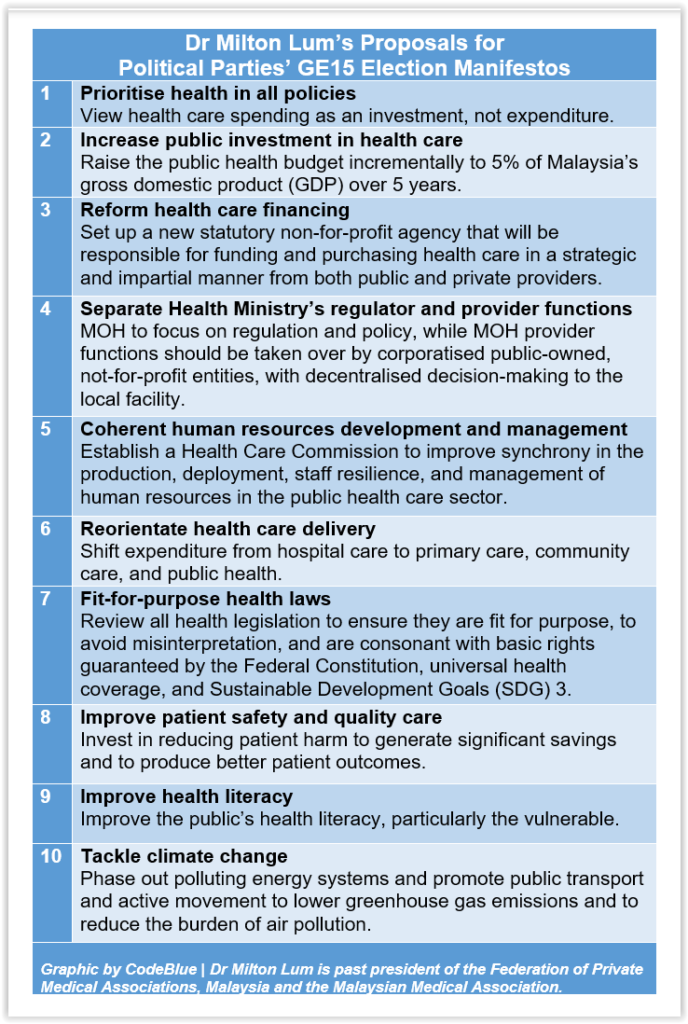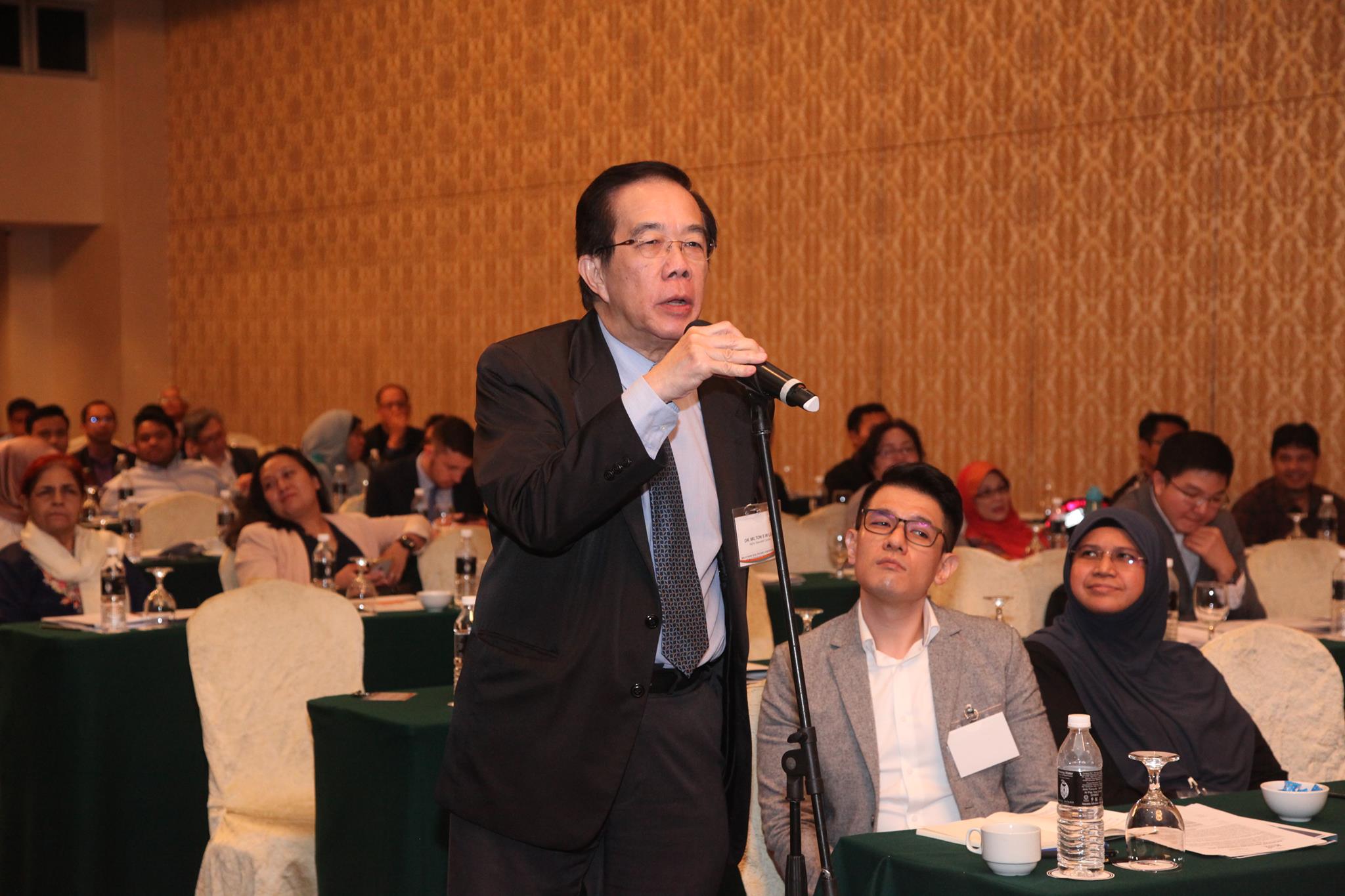Covid-19 was Malaysia’s worst public health disaster, with the health care system on the verge of collapse on several occasions, laying bare its faults.
Chronic underfunding, and hence, underinvestment, in the public health care sector extracted, and is still extracting, a heavy price from the rakyat.
In addition, a series of fatal errors contributed significantly to the numbers of cases and deaths, with Malaysia having the highest death rate per capita in ASEAN.
The primary lesson from Covid-19 was the massive impact of inequity and structural disadvantage on its course and outcome.
But have policymakers learnt and instituted changes to futureproof the health care system?
There is no indication that concrete measures have been taken to address fundamental health and health care issues, which include chronic underinvestment in the public health care sector, health inequity, health care professionals’ resilience, mental health, non-communicable diseases, building ventilation, and the social determinants of health.

Health: A Central Issue in GE15
The government made an international commitment to Universal Health Coverage (UHC) and Sustainable Development Goals (SDG), of which SDG3 is “Good Health and Wellbeing”.
The government ratified the Paris Agreement, a legally binding treaty on climate change, with the goal to limit global warming to below 2, preferably to 1.5 degrees Celsius.
UHC requires a focus on primary health care to improve access to quality essential services, sustainable financing and financial protection, improved access to essential medicines and health products, trained health care professionals, sound labour policies, civil society’s participation in national health policies, and improved monitoring, data, and information.
SDG3 requires addressing the social determinants of health, promotion of intersectoral approaches for health, and prioritising of health in all policies and healthy settings.
The Paris agreement requires economic and social transformation, based on the best available science, to reduce greenhouse gas (GHG) emissions. Malaysia made a commitment to reduce GHG by 45 per cent by 2030.
There has been much discussions and debates in the medical and other health care professions, as well as in civil society, about expectations of the government’s responsibilities to health and health care. Some salient issues of these debates are discussed below.
Prioritise Health In All Policies
The primary focus of the next government should be to prioritise health in all policies.
Any spending on health and health care should be viewed as an investment for the future and not an expenditure item.
Increase Budget Allocation Of The Public Sector
Malaysia’s public investment in health care has been chronically inadequate, with about 2 per cent of gross domestic product (GDP) spent on health care, compared to 5 to 8 per cent in countries of similar developmental status.
There are high levels of inefficient and regressive out-of-pocket health payments (about 35 per cent of total health expenditure (THE), with many families rendered financially insolvent because of catastrophic health expenditures, as well as private expenditure which accounted for 47.6 percent of THE.
It was simplistic to laud the 11.5 per cent increase in the Ministry of Health’s (MOH) budget, which only paralleled the 12.1 per cent increase in the total Budget 2023 announced on October 7, 2022.
As such, the current health budget allocation for the public sector has to be increased incrementally to 5% over a period of five years.
Additional budget allocations are necessary to make up for the years of chronic underfunding and underinvestment, e.g. repairs, replacements, and renovations.
However, increased health financing and allocations must be accompanied by cost inflation containment, improved efficiency, and reduction of waste.
Health Care Financing Reforms
The government should establish a new statutory non-for-profit agency, accountable to Parliament, to manage all public funding for health care.
This agency would be responsible for funding and purchasing health care in a strategic and impartial manner from both public and private providers.
Its strategic, efficient and transparent functions should ensure more coordinated and efficient use of providers to meet public needs; more effective integration across all levels of care; and shift expenditure from hospital care to primary care, community care and public health.
The different options for funding include general taxation, payroll tax, consumption tax, donations, cost recovery from employers etc.
Trust and transparency are the sine qua non for securing and sustaining public support for reforms.
Separate Health Ministry’s Regulator And Provider Functions
The MOH’s current dual roles has been the root cause of implementation of policies which have contributed to the inequitable public-private sector divide and even a perception of double standards. It is time to end the current schizophrenic and myopic approach.
The separation of MOH’s regulator and provider functions will permit it to provide strategic and policy leadership; strengthen and expand its current public health and research function; and drive intersectoral coordination needed for health promotion and protection, by monitoring the performance, quality and safety of all public and private health care facilities and services, as well as population-based health improvement targets.
The current MOH provider functions should be taken over by corporatised public-owned, not-for-profit entities, with decentralised decision-making to the local facility levels.
Coherent Human Resource Development And Management
Health care professionals (HCP) are the lifeblood of any health system. The current production, employment, deployment, and remuneration is not only inefficient and ineffective – it messes up the lives of many young Malaysians.
It has to be replaced with a coherent system in which decisions are based on strategic plans founded on regular and timely data.
The establishment of a Health Care Commission, similar to the Police Commission and other similar commissions, will go a long way towards synchrony in the production, deployment, staff resilience and management of human resources in the public sector.
Reorientate Health Care Delivery
There is a compelling case to shift from hospital care to primary care, community care, and public health.
The total health expenditure of the hospital sector increased from 48.3 per cent in 1997 to 55.3 per cent in 2019, far ahead of primary care. About 15 per cent of hospital admissions are for conditions manageable in primary care.
There is poor coordination between primary and hospital care; as well as within and between the public and private sectors.
The driver would be to shift expenditure from hospital care to primary care, community care and public health.
Fit-For-Purpose Health Laws
There are about 30 health laws listed in the MOH website. There is overlap of some of these Acts with other Acts.
For example, some sections of the Poisons (Amendment) Act 2022 are not consonant with the Dangerous Drugs, Medical, Dental, Private Healthcare Facilities and Services, and Personal Data Protection Acts.
A revision of all health laws is necessary to ensure that they are fit for purpose, avoid misinterpretation, and are consonant with basic rights guaranteed by the Federal Constitution, UHC, and SDG3.
Patient Safety And Quality Care
Adverse events due to unsafe care is a leading cause of disability and death. It has been estimated that 1 in 10 patients in high income countries is harmed while receiving hospital care, with nearly 50 per cent of them preventable.
Globally, about 4 in 10 patients are harmed in primary and ambulatory care, with up to 80 per cent preventable. In OECD countries, about 15 per cent of total hospital activity and expenditure is directly caused by adverse events.
Malaysian reports of 53 per cent management errors in public primary care clinics, and 15.3 per cent adverse events and 49.7 per cent near misses in public hospitals are disconcerting.
The 2016 Sultanah Aminah Hospital fire was an example of a fatal patient safety issue.
There is a need to stress on patient safety and quality care, as investments in reducing patient harm leads to significant savings and more importantly, better patient outcomes. Even the simple act of engaging patients, if done well, can reduce the burden of harm by 15 per cent.
Improve Health Literacy
The reported health literacy of Malaysians with regard to health care, diseases prevention, and health promotion were 49.1 per cent, 44.2 per cent, and 47.5 per cent.
Health literacy is limited among senior citizens (68 per cent), those with lower education level (64.8 per cent), and lower household income (49.5 per cent).
Measures have to be taken to improve the public’s health literacy, particularly the vulnerable, to improve everyone’s health.
Climate Change
Greenhouse gas emissions (GHG) from fossil fuels are major contributors to both climate change and air pollution. Many policies and individual measures, e.g. transport, food and energy choices, can reduce GHGs and produce major health benefits.
The impact of climate change on human health, especially air pollution, has been addressed previously.
The phasing out of polluting energy systems, and the promotion of public transportation and active movement, could both lower GHGs and reduce the burden of air pollution.
In summary, the aforesaid is well encapsulated by the Institute for Healthcare Improvement’s quintuple aims, i.e. improving population health, enhancing the care experience, reducing per capita cost of health care, job satisfaction for health care professionals, and advancing health equity.
Is There Political Will?
Health is a public good with large societal returns on investment. The role of the government is fundamental.
Covid-19 has clearly revealed the criticality of continued public investments in health.
Are political parties and politicians up to the task of addressing the critical issues currently facing the health care system, which is clearly unsustainable? Or are they going to kick it down the road to the next government?
Their answer(s) will help many in deciding who to vote for.

Dr Milton Lum is a Past President of the Federation of Private Medical Associations, Malaysia and the Malaysian Medical Association. This article is not intended to replace, dictate or define evaluation by a qualified doctor. The views expressed do not represent that of any organisation the writer is associated with.
- This is the personal opinion of the writer or publication and does not necessarily represent the views of CodeBlue.








